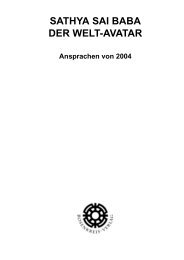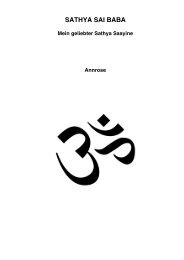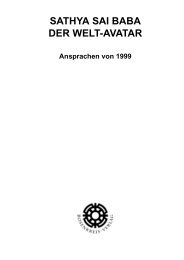- Page 1:
Sathya Sai Baba • The World-Avata
- Page 4 and 5:
Publisher's note: The publication o
- Page 6 and 7:
VI. MAN - INDIVIDUAL Path of Light
- Page 9 and 10:
What's the Purpose of this Book? Du
- Page 11 and 12:
Now, here we have finally reached a
- Page 13 and 14:
Introduction Why should books be wr
- Page 15:
I. GOD - ATMAN - BRAHMAN
- Page 18 and 19:
Today incredible things are happeni
- Page 20 and 21:
spiritual discipline. He is the cor
- Page 22 and 23:
sway, it becomes dullness. When the
- Page 24 and 25:
The living being on account of an i
- Page 26 and 27:
ance is darkness. Darkness can pers
- Page 28 and 29:
There is a great deal of argument a
- Page 30 and 31:
education has to teach man how to t
- Page 32 and 33:
ighteousness in any circumstances.
- Page 34 and 35:
Through devotion alone can that sel
- Page 36 and 37:
ways. Take the food that you consum
- Page 38 and 39:
ody decays and disintegrates, the i
- Page 40 and 41:
ing use of the vibrations from the
- Page 42 and 43:
ything. Have faith in God and love
- Page 44 and 45:
eousness, so that the world may sai
- Page 46 and 47:
Today you have to acquire the favou
- Page 48 and 49:
one home or the grief in another? I
- Page 50 and 51:
any of the senses. This transcenden
- Page 53 and 54:
OM When we say: “One without a se
- Page 55 and 56:
The Vedas prescribe the repetition
- Page 57 and 58:
5. Krishna said: “Whatever else a
- Page 59 and 60:
10. There are many who argue that t
- Page 61:
III. INCARNATION OF GOD - AVATARS
- Page 64 and 65:
The petty investigation done by ord
- Page 66 and 67:
ation. It is this confluence that h
- Page 68 and 69:
ti) has come, all together, in one
- Page 70 and 71:
Instead of trying to understand the
- Page 72 and 73:
mood and make it a permanent posses
- Page 74 and 75:
have perfect freedom to select the
- Page 76 and 77:
looking for him in some particular
- Page 78 and 79:
true nature. In this context, even
- Page 80 and 81:
a thing as Divine grace and love. I
- Page 82 and 83:
ner which smacks of selfishness but
- Page 84 and 85:
must try and continue this. To forg
- Page 86 and 87:
entire story is unfolded, then you
- Page 88 and 89:
these seven, you can consider as ha
- Page 90 and 91:
misled into error and loss. The tim
- Page 92 and 93:
ened by spiritual discipline to inc
- Page 94 and 95:
among the professed followers of th
- Page 96 and 97:
pluck flowers and hasten their deat
- Page 98 and 99:
to save some one. I have no illness
- Page 100 and 101:
of this Avatar. When I was upstairs
- Page 102 and 103:
pear, do not doubt it. That is the
- Page 104 and 105:
within ten more births! Strive to a
- Page 106 and 107:
Some people remark that Ramakrishna
- Page 108 and 109:
there is nothing else to see or hea
- Page 110 and 111:
unrighteous will fall into disaster
- Page 112 and 113:
for without them, the best in you c
- Page 114 and 115:
I have come to light the lamp of lo
- Page 116 and 117:
It has been suggested in a letter t
- Page 118 and 119:
this manifoldness is but he, seen t
- Page 120 and 121:
A glance from the corner of the eye
- Page 122 and 123:
What is needed today to save onesel
- Page 124 and 125:
ayi means mother and Baba means fat
- Page 126 and 127:
him, when he finds him desperately
- Page 128 and 129:
You should offer your knowledge for
- Page 130 and 131:
Divine love is the only panacea for
- Page 132 and 133:
Once on a Shivaratri day, after I h
- Page 134 and 135:
I prevented them, because there are
- Page 136 and 137:
me this, then I shall give you this
- Page 138 and 139:
you; that will save you from concei
- Page 140 and 141:
Unless you brighten your vision wit
- Page 142 and 143:
trudge along the wilderness to whic
- Page 144 and 145:
The Divine has placed some limitati
- Page 146 and 147:
you have to understand. You must be
- Page 148 and 149:
It is a rare privilege to be born a
- Page 150 and 151:
immortal name. No other village has
- Page 152 and 153:
were once convinced and listen agai
- Page 154 and 155:
scribed as my speaking through them
- Page 156 and 157:
work that each does is important fo
- Page 158 and 159:
the universe is experienced. Ud-yog
- Page 160 and 161:
elieves that he is the body, the se
- Page 162 and 163:
nounces the Supreme principle which
- Page 164 and 165:
tities are capable of such exercise
- Page 166 and 167:
and experience in dreams and witnes
- Page 168 and 169:
awaken all the sweetness latent in
- Page 170 and 171:
Revelation Remember that with every
- Page 172 and 173:
as the power to discriminate betwee
- Page 175 and 176:
Relationship between Humans and God
- Page 177 and 178:
also in the innermost recesses of t
- Page 179 and 180:
en it on trust; you take many thing
- Page 181 and 182:
of breezes or of things that it mov
- Page 183 and 184:
God subjects his devotees to tests
- Page 185 and 186:
Repeat to yourself the truth that t
- Page 187 and 188:
tures deal with only one goal but t
- Page 189 and 190:
toddy, brandy, etc., are indulged i
- Page 191 and 192:
texts like Bhagavadgita, Mahabharat
- Page 193 and 194:
There are in this huge gathering pe
- Page 195 and 196:
Jesus taught simple practical lesso
- Page 197 and 198:
all this is the Divine." This is th
- Page 199 and 200:
Jesus was a person whose only joy w
- Page 201 and 202:
The best way to resolve the confusi
- Page 203 and 204:
People talk about spiritual exercis
- Page 205 and 206:
2. The earthly kingdom, alternating
- Page 207 and 208:
light and love to all. He attracted
- Page 209 and 210:
duality has been shed. This is the
- Page 211 and 212:
Divine Order - The New Religion Div
- Page 213 and 214:
such a multiplicity of names. But e
- Page 215 and 216:
the appropriate dictates of conscie
- Page 217 and 218:
complishing many difficult things w
- Page 219 and 220:
ner truth, the contemplation of one
- Page 221 and 222:
Divine law is not an ordinary affai
- Page 223:
devotion has its own measure. It wi
- Page 227 and 228:
Evolution of the whole Mankind You
- Page 229 and 230:
and the bliss that knowledge confer
- Page 231 and 232:
the receiver and thrill the giver,
- Page 233 and 234:
Three things are most essential tod
- Page 235 and 236:
Spiritual Laws - Natural Laws Natur
- Page 237 and 238:
his knowledge or without his resolu
- Page 239 and 240:
cific benefits and bounties have to
- Page 241 and 242:
The inescapable destiny of every li
- Page 243 and 244:
If there is an iron law of karma wh
- Page 245 and 246:
The Duty of Mankind and Nations As
- Page 247 and 248:
form and will have on effect on the
- Page 249 and 250:
this land, since thousands of years
- Page 251 and 252:
mantras, sacred formula, have poten
- Page 253 and 254:
made the home of a happy family of
- Page 255 and 256:
fear. But, I assure you that very s
- Page 257 and 258:
These are eternal truths; but, Indi
- Page 259 and 260:
Your lives are spent largely in the
- Page 261 and 262:
the name of Sai. Sai has absolutely
- Page 263 and 264:
ealization of that power, for earni
- Page 265 and 266:
out a second. The body is subject t
- Page 267 and 268: and discrimination leads to God. Th
- Page 269 and 270: sible is wrong. While God in the fo
- Page 271 and 272: very much. I shall not give up Putt
- Page 273 and 274: whatever action he does all belong
- Page 275 and 276: ow, hence, the source of the Divine
- Page 277 and 278: To earn that calmness, steady const
- Page 279 and 280: self, and always walk in the path o
- Page 281 and 282: How then, is love to be cultivated?
- Page 283 and 284: Unless you have love, you cannot cl
- Page 285 and 286: Education The end of wisdom is free
- Page 287 and 288: and grows into a tree, man too has
- Page 289 and 290: ice. Let the mind, the heart and th
- Page 291 and 292: Success in this task can be achieve
- Page 293 and 294: he is able to discover and discharg
- Page 295 and 296: moving about, lack of sufficient sl
- Page 297 and 298: Brahman is not in him. In the heart
- Page 299 and 300: Take the one truth that God is pres
- Page 301 and 302: tem but it is sad that in the name
- Page 303 and 304: elders, that will be referred to as
- Page 305 and 306: edge. He chooses one small part of
- Page 307 and 308: trouble. He himself eats and sleeps
- Page 309 and 310: to uphold the dignity of the countr
- Page 311 and 312: When you are able to control desire
- Page 313 and 314: asked if his name was there in that
- Page 315 and 316: You are the Eternal Divinity, if on
- Page 317: cause all of them regard the body a
- Page 321 and 322: "God will do whatever is necessary
- Page 323 and 324: elieve in the Vedas as the ultimate
- Page 325 and 326: chopping off the head, since the do
- Page 327 and 328: they grow up in their company and l
- Page 329 and 330: Whatever talent a person has should
- Page 331 and 332: He who adores the past is considere
- Page 333 and 334: thread running through from lesson
- Page 335 and 336: so that you can picture the kind of
- Page 337 and 338: politeness and good manners are est
- Page 339 and 340: Education must enable a person to d
- Page 341 and 342: To arrive at the truth, we must go
- Page 343 and 344: God. We have therefore to promote e
- Page 345 and 346: the inner vision. A women without t
- Page 347 and 348: taken into account. The practitione
- Page 349 and 350: Struggle against the Blindness and
- Page 351 and 352: He denies the innate excellence of
- Page 353 and 354: the temple I like. When you seek to
- Page 355 and 356: is very beneficial and good spiritu
- Page 357 and 358: It is enough if love is cultivated,
- Page 359 and 360: Base your activities on righteousne
- Page 361 and 362: serves two purposes: the extinction
- Page 363 and 364: ious tasks, gladly and with perfect
- Page 365 and 366: Members of this organization must b
- Page 367 and 368: and their surroundings are bright a
- Page 369:
VI. MAN - INDIVIDUAL
- Page 372 and 373:
his heart and become pure by surren
- Page 374 and 375:
cial uniqueness of duty, and nature
- Page 376 and 377:
eality of all things. He is everywh
- Page 378 and 379:
First: Faith - that can stand the r
- Page 380 and 381:
keep your eyes riveted on Brahman w
- Page 382 and 383:
When such tests come from God, they
- Page 384 and 385:
water can rise. If air enters, the
- Page 386 and 387:
When the magnet does not attract th
- Page 388 and 389:
A life of spiritual discipline invo
- Page 390 and 391:
the external symbols of riches or p
- Page 392 and 393:
Attend all the sessions in the hall
- Page 394 and 395:
dust. Faith in God and in his omnip
- Page 396 and 397:
eings and all objects, wherever he
- Page 398 and 399:
God is the embodiment of compassion
- Page 400 and 401:
The part-filled people have attaine
- Page 402 and 403:
many names in many areas through ma
- Page 404 and 405:
404 Gayatri Mantra - The universal
- Page 406 and 407:
It is impossible to grasp the myste
- Page 408 and 409:
man, mentioned therein and oneself.
- Page 410 and 411:
day, is part of this process of de-
- Page 412 and 413:
Meditation Today many people in the
- Page 414 and 415:
you should regard your body as your
- Page 416 and 417:
For, light is God; God is light. Wh
- Page 418 and 419:
surface when the veils of ignorance
- Page 420 and 421:
The Vedas say that there are three
- Page 422 and 423:
stood by experiments and instrument
- Page 424 and 425:
424 The Body as Temple of God The b
- Page 426 and 427:
which is between attachment and det
- Page 428 and 429:
Do not spend much thought on the bo
- Page 430 and 431:
country is described as the mother.
- Page 432 and 433:
Man and women, though master and wi
- Page 434 and 435:
A wife with such a nature is a wife
- Page 436 and 437:
Rama and Krishna, religious teacher
- Page 438 and 439:
women to play their role in society
- Page 440 and 441:
intelligence, you can control death
- Page 442 and 443:
present in everyone. The fact that
- Page 444 and 445:
it will be. I shall reveal the Divi
- Page 446 and 447:
the answer. Now, you must first und
- Page 448 and 449:
If, at all times, you are completel
- Page 450 and 451:
All lives, lived without faith and
- Page 453 and 454:
The Ages In the Golden Age, Divine
- Page 455 and 456:
This Iron Age is praised in the scr
- Page 457:
VIII. VISION - FUTURE
- Page 460 and 461:
Sathya Sai Baba Gayatri OM Sayishva
- Page 463 and 464:
Glossary Arjuna - the disciple of L
- Page 465 and 466:
three types of lingas can emerge. T
- Page 467:
Index









